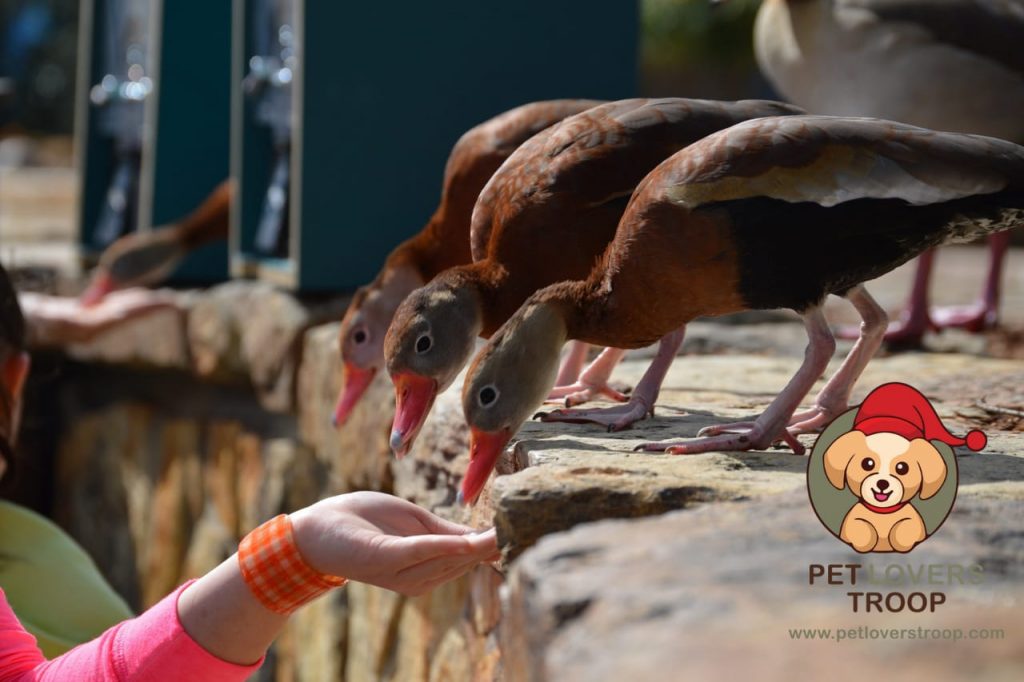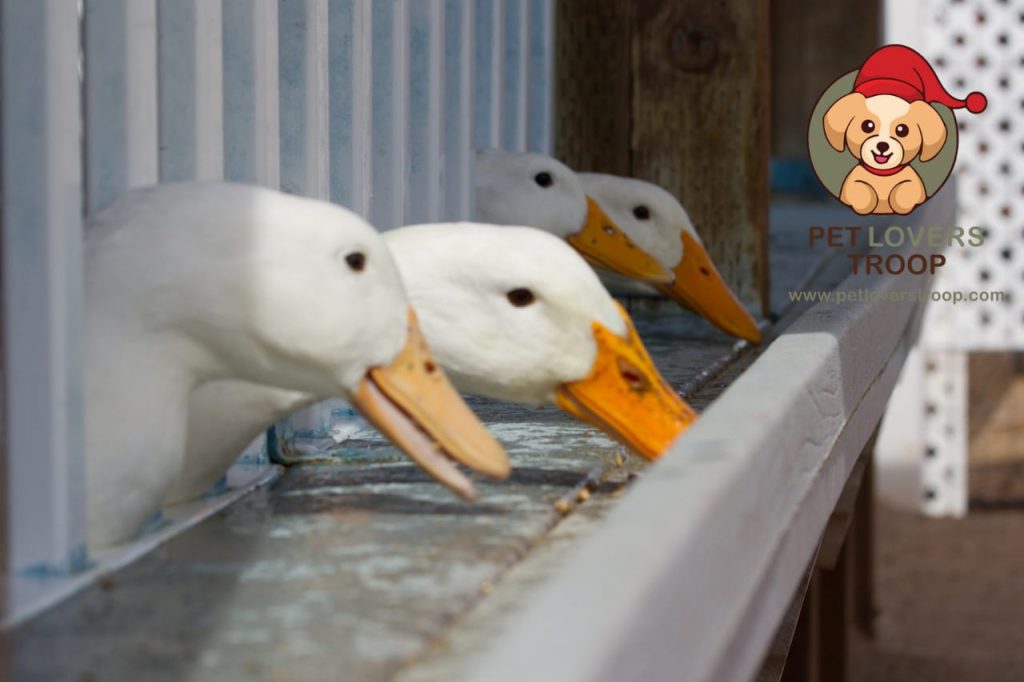Carol learned a lesson the hard way about feeding ducks last spring. She always thought, “Feed is feed and poultry feed is poultry feed.” So, when the local feed store ran out of duck feed, She grabbed a generic chicken feed. She thought her ducks would be fine but it was surely a big mistake.
Within days, her usually sprightly ducks were sluggish. One evening, she found Daisy, Khaki Campbell was sitting oddly with her legs splayed out. She was barely standing the next morning.
Carol panicked and called a local poultry vet. She listened patiently and said, “She might have a niacin deficiency. Chickens and ducks are different and ducks need more niacin.”
Check out: Fleas and Ticks in Pets: How to Prevent and Treat Infestations – June 2025
Turns out, the chicken feed lacked sufficient niacin for ducks. Her ducks were developing leg deformities, soft eggshells, and lost their shine.
After switching to a proper duck feed enriched with niacin, things got better. It wasn’t easy, but her flock recovered, waddling along contentedly and laying solid eggs once more.
This incident made her realize how critical proper feeding is. Feeding ducks isn’t merely about scattering some grain on the ground. Knowing their special requirements will prevent you from getting into serious trouble.

Why Meeting Your Flock’s Nutritional Needs Is Really Important?
One of the largest myths you’ve probably heard is that ducks can be fed the same feed as chickens or turkeys. It’s a myth. Ducks are waterfowl and their nutritional requirements are quite different.
For instance, ducks need to obtain around two times more niacin than chickens. Niacin (vitamin B3) is important for their metabolism and the development of legs. Ducklings get splayed legs or other malformations if they do not have sufficient niacin.
Ducks enjoy dabbling in water and usually eat pond plants and insects in addition to their food. This adds nutrients to them.
Their digestive system is adapted to process a more diverse diet. So, feeding them just dry chicken feed limits their nutrition.
When selecting feed, ensure it’s duck or waterfowl specific. It is one of the simplest ways to prevent expensive health issues in the future. Let’s get into what you should know to keep your ducks happy and healthy using the proper duck feed.
Read more: Bird Nutrition Basics: What to Feed your Pet Bird for a Balanced Diet
What Constitutes Optimal Duck Feed Nutrition?
Thinking about what should be in good duck feed? What are the must-haves to keep your flock in tip-top shape? Here’s the full guide;
Protein and Niacin: The Foundation of Duck Health
Think of protein as the building block for ducklings. For the first two weeks, ducklings need around 20% protein in their feed. After that, a 17% protein diet is enough for them to grow strong and healthy.
Ducks require about twice as much niacin as chickens. That little vitamin plays a huge role in their leg development and overall well being. Commercial duck feed now usually has the right niacin levels included, so no need to play scientist yourself.
Vitamins and Minerals Has Big Impact
Calcium is critical for laying ducks. Eggshells get thin or soft without enough calcium which isn’t good news for your breakfast table.
Vitamin D facilitates the absorption of calcium while phosphorus aids in metabolism. Zinc, manganese, and selenium are trace nutrients that support healthy feathers and a healthy immune system.
You’ll notice drab feathers, low-quality eggs, and even lethargic behavior if any of these are missing. Don’t underestimate the power of balanced vitamins and minerals in duck feed.
Read more: Are Ducks Good Pets?
Best Duck Feed Brands To Trust
Walking into a feed store can feel overwhelming with so many options. Here are some brands you can use and can vouch for:
Purina Duck Feed Pellets
Purina is a classic trusted brand. Their duck feed pellets come with added niacin and the right protein balance. People feed these to their adult ducks, and the pellets minimize waste.
There will be no scattering all over your yard. Your ducks love them, and they help keep the flock healthy during winter.
Know more about: Traveling with Pets: How to Make Trips Safe and Stress-Free – March 2025
Mazuri Waterfowl Maintenance
Mazuri is the Rolls Royce of duck feed. They have specially formulated feeds for all duck life stages from ducklings to adults.
Most vets recommended Mazuri. If you switch to their starter feed, the duckling can grow strong and healthy like others.
Nutrena NatureWise All Flock
This feed is great for mixed flocks. It contains around 16% protein along with added vitamins and minerals. I found it especially helpful in spring, though I made sure to supplement niacin for the ducklings.
Kalmbach Duck & Goose Starter/Grower
This is an excellent choice for young ducklings, offering 20% protein and added niacin. It’s also enriched with probiotics and prebiotics to support healthy digestion. The crumble form is gentle on small bills, making it easy for ducklings to eat.
Read more: The Ultimate Guide to Choosing the Right Duck Feed
Homemade Duck Feed Recipes
A few years ago, Hannah got ambitious and tried to make homemade duck feed. It felt rewarding, but balancing the nutrients isn’t as simple as throwing grains in a bucket.
Here’s a recipe that worked for so many duck owners:
- Whole oats and barley for energy
- Cracked corn for carbs
- Sunflower seeds and flaxseeds for fats and omega-3s
- Lentils or split peas for protein
- Brewer’s yeast (rich in niacin)
- Ground eggshells or oyster shell for calcium
Sara, a duck owner swears by adding brewer’s yeast as her “secret sauce” for keeping her ducks’ legs strong and feathers shiny.
One thing you should learn is, if you don’t add a vitamin-mineral premix, your ducks can still get deficiencies. Fertrell’s Poultry NutriBalancer is a great premix for use.
Why Consider Organic Duck Feed Options?
We all are fans of organic, particularly when it involves animals that matter to me. Organic duck food contains no artificial pesticides, herbicides, or GMOs. So, fewer toxins in your ducks and their eggs.
Plus, organic feed usually means better farming practices that support the environment and animal welfare. Harry runs a small organic farm and swears her ducks’ eggs taste better and have thicker shells with organic feed. Organic feed is more expensive but the health effects and peace of mind are well worth it.
Read more: Nutrient Requirements for Organic Egg-laying Ducks
Which Duck Feed Ingredients Are Important?
Selecting duck feed ingredients is the key to their health. Here are some things you should search for:
- Protein sources: Soybean meal, fish meal, or alfalfa are typical.
- Energy sources: Corn, wheat, or barley are typical.
- Added vitamins and minerals: Make sure niacin is listed or the feed is duck-specific.
- Fats: For energy and shiny feathers.
- Additives: Some feeds have probiotics or enzymes which is a nice bonus for digestion.
Avoid feeds with excessive salt or those medicated for chickens. Daniel made the mistake of using medicated chicken feed on a duck with a minor illness. IIt made her worse because the medication wasn’t suitable.

Duck Feed Pellets vs. Crumbles
When my first ducklings hatched, I gave them pellets and regretted later. The little guys struggled to eat them. Switching to crumbles made all the difference.
Pellets are great for adult ducks because they reduce feed waste and are easy to store. Crumbles are softer and perfect for ducklings learning to eat. A good rule of thumb: start ducklings on crumbles, then transition to pellets as they grow.
Read more: Bird Lifespan: How to Care for a Long-Term Feathered Friend
Why Proper Duck Feed Makes All the Difference
I can’t stress this enough. Investing in the right feed saves money in the long run. Healthy ducks lay more eggs, have shinier feathers, and stay disease-free.
Jerry tried feeding his ducks mostly table scraps and leftover bread. He ended up with weak birds and poor egg production. After switching to formulated duck feed, his flock’s health improved dramatically.
Read more: Bird Nutrition Basics: What to Feed your Pet Bird for a Balanced Diet
Do Ducks Get Bored?
If you think ducks just eat and chill, think again! Ducks get bored and stressed if their routine is too repetitive.
To keep mine entertained, I scatter their feed around the yard so they forage naturally. Sometimes, I float peas or lettuce leaves in their pond for them to dabble. It’s like duck entertainment time and healthier for them mentally and physically.
Read more: Traveling with Pets: How to Make Trips Safe and Stress-Free – March 2025
My neighbor Kate swears by this to prevent her ducks from plucking out their feathers or getting aggressive.

Conclusion
Taking care of ducks is more than just throwing them a cup of food, it’s learning about their special requirements and providing them with a proper diet from the very beginning.
Even if you purchase commercial duck food, prepare your own, or use organic, the most important thing is learning about their special requirements.
Read labels, ask experts, and watch your flock thrive.
Always remember, a well-fed duck is a happy duck and a happy duck means a happy you. Healthy ducks are more active, lay better eggs, and rarely fall sick. Take care of their diet, and they’ll reward you with joy, color, and endless quacks of gratitude.

